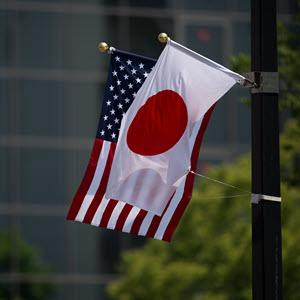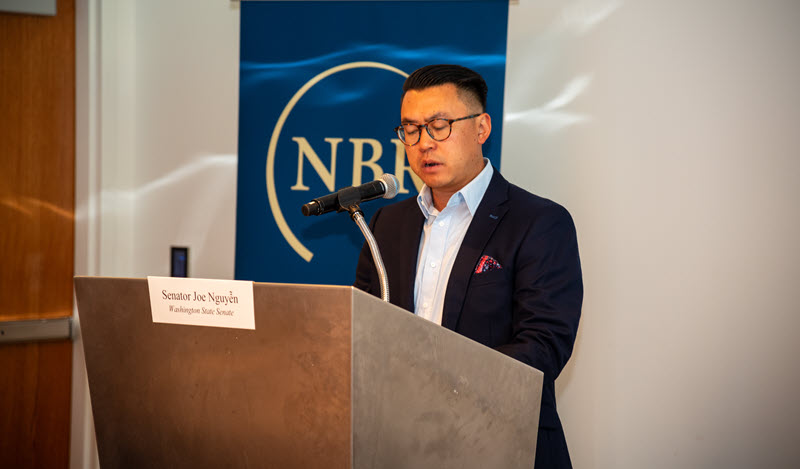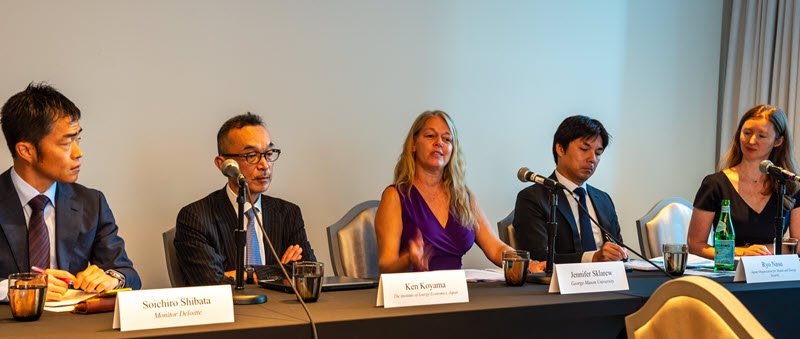
Enhancing U.S.-Japan Energy System Resilience amid Shifting Geopolitical Tensions
Weathering the Storm
U.S.-Japan Leadership in Indo-Pacific Energy Security
On August 15, 2023, in Seattle, NBR hosted a high-level roundtable on U.S.-Japan leadership in Indo-Pacific energy security to analyze the United States’s and Japan’s respective roles in the energy space as APEC host and G-7 president, respectively. Following keynote remarks by Senator Joe Nguyễn, Representative for Washington State’s 34th Legislative District and Chair of the Environment, Energy, and Technology Committee in the Washington State Senate, the discussion focused on U.S. and Japanese domestic and international energy security strategies, particularly within the contexts of the Fukushima nuclear disaster and the Russian invasion of Ukraine. Key findings from the discussion include the following:
Diverse Energy Pathways for Each Country
- As was also noted in discussions at the G-7 Summit in Japan, it is important to continue encouraging and enabling a diverse range of energy transition pathways in order for countries to achieve their domestic net-zero goals while strengthening national and regional energy security.
- The degree to which countries utilize liquified natural gas (LNG), nuclear energy, or renewable energy resources will vary, depending on their specific circumstances, such as existing capacity, national emissions reduction targets, and cost.
The Effects of the Global Divide on Energy Security
- As a result of the Russia-Ukraine conflict, energy prices have increased and energy security has returned to the agenda. Even developed countries like Japan and the United States are vulnerable to higher costs.
- The global North and the global South face affordability and power supply concerns:
- Europe last year could afford to buy global supplies like LNG at high prices, but Bangladesh, India, and African countries could not afford such resources and are facing severe electricity shortages. As a result of higher costs and low supplies, many countries in the global South are reverting to traditional fossil fuels. These trends threaten to delay or derail energy transitions worldwide.
- Countries in the global North must work together to minimize transition costs for the global South, particularly in regions like Southeast Asia, where decisions on the exact energy mixes should be made cautiously.
Energy System Resilience
- It is important to expand the concept of energy system resilience beyond energy security in the traditional sense, which was defined as the recovery of the energy system and the return to its original functionality.
- The Covid-19 pandemic and the Russian invasion of Ukraine underscored the importance of (1) communication of resilience priorities to support supply chain security, (2) inclusion of the economic priorities held by community stakeholders within the recovery process, and (3) improvement of communication about shock-induced vulnerabilities between nations.
Food-Energy-Water-Climate Nexus
-
The release of treated water from the Fukushima nuclear power plant into the ocean has highlighted both the local and geopolitical challenges of adding nuclear energy to the energy mix:
- Domestically, the Japanese government took early actions to establish regulations on food and water radiation levels. However, a failure to communicate the significance of interrelated regulations for food, energy, and water policies to the public has led to widespread confusion and misconceptions.
- Internationally, neighboring countries have used the release of nuclear wastewater as a geopolitical talking point to leverage against Japan.
- Both domestic and international elements of the Fukushima wastewater release could hold valuable lessons for the United States and other countries as they consider adopting more nuclear energy within the domestic energy mix.
U.S.-Japan Cooperation on Regional Energy Security
- U.S. leadership through the Mineral Security Partnership could be crucial to setting the agenda on critical minerals investment.
- Small hydropower development in certain countries should be explored as a potential area for greater bilateral cooperation.
- The United States and Japan should increase bilateral collaboration on nuclear energy technology research and demonstration between national labs.
- The deployment of charging infrastructure for electric vehicles is a huge project that needs careful planning and is one potential area where the United States and Japan could work together.
- Japan is well-equipped to lead feasibility studies on hydrogen and ammonia in Southeast Asia, and the United States should support these efforts through developing hydrogen-hub projects and researching hydrogen utilization in port areas.
- In addition to bilateral cooperation, the Quad framework offers complementary multilateral opportunities for developing hydrogen energy storage.
Speakers
Clara Gillispie, The National Bureau of Asian Research
Ken Koyama, Institute for Energy Economics, Japan
Senator Joe Nguyễn, Chair of the Environment, Energy & Technology Committee,
Washington State Senate
Ryo Nasu, Japan Organization for Metals and Energy Security
Soichiro Shibata, Monitor Deloitte
Jennifer Sklarew, George Mason University

Senator Joe Nguyễn, Chair of the Environment, Energy & Technology Committee, Washington State Senate, delivers keynote remarks.



